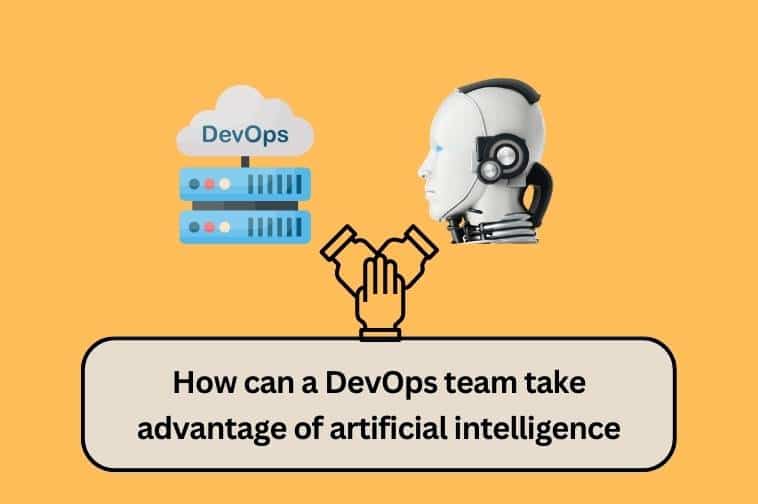In this Quick guide, I will let you know how can a DevOps team take advantage of artificial intelligence. AI can be a powerful tool for DevOps teams looking to streamline and automate their processes. Let’s get started!!
Introduction to Artificial Intelligence in DevOps
Artificial intelligence (AI) has quickly become a buzzword in the tech industry, with many companies looking to implement it into their systems and processes. One area where AI has the potential to make a significant impact is in the realm of DevOps, the practice of bringing together development and operations teams in order to streamline and automate processes.
Using Machine Learning Algorithms in Development
The main goal of DevOps is to make the development, testing, and deployment of software faster and more efficient. By using AI, DevOps teams can automate many of the manual tasks that currently take up a significant amount of time and resources. This can free up developers and operations staff to focus on more high-level tasks, leading to increased productivity and efficiency.
One of the main ways that AI can be used in DevOps is through the use of machine learning algorithms. These algorithms are able to analyze large amounts of data and make predictions or recommendations based on that data. This can be especially useful in the development process, where machine learning algorithms can help identify patterns and trends in code that might not be immediately apparent to a human developer.
For example, a machine learning algorithm might be able to identify that certain lines of code are frequently causing errors or bugs, allowing developers to focus their efforts on fixing these issues. Alternatively, the algorithm might be able to recommend changes to the code that would improve performance or efficiency.
Automating the Deployment
Another area where AI can be used in DevOps is in the deployment and management of software. Many DevOps teams use tools like containers and microservices to make the deployment of software faster and more flexible. These tools can be difficult to manage manually, however, and this is where AI can come in.
By using AI to automate the management of containers and microservices, DevOps teams can save a significant amount of time and effort. For example, an AI-powered system might be able to automatically scale containers up or down based on demand, ensuring that resources are always being used efficiently. Similarly, an AI system might be able to identify and fix issues with containers or microservices before they cause problems, preventing downtime and improving overall system reliability. Artificial intelligence (AI) has been making waves in various industries, and the recruiting process is no exception.
Improving Communication and Collaboration with AI
Another way that AI can be used in DevOps is through the use of chatbots and other automated communication systems. These systems can handle a wide variety of tasks, such as answering common questions from users, providing status updates, and even identifying and resolving issues.
By using chatbots and other automated communication systems, DevOps teams can reduce the amount of time they spend on routine tasks and focus on more high-level tasks. Additionally, these systems can help to improve communication and collaboration within a DevOps team, as they can facilitate communication between different teams and departments.
Enhancing Security with Artificial Intelligence
Finally, AI can be used in DevOps to improve security. Many DevOps teams are responsible for managing and securing large amounts of sensitive data, and AI can be used to help identify and prevent potential security breaches.
For example, an AI system might be able to monitor network traffic and identify unusual activity, alerting the DevOps team to the possibility of a security threat. Alternatively, the system might be able to automatically patch vulnerabilities in the system, reducing the risk of a breach.
Challenges for Implementing AI in DevOps
Overall, AI has the potential to greatly improve the efficiency and effectiveness of DevOps teams. By automating routine tasks, improving communication and collaboration, and enhancing security, AI can help DevOps teams work more efficiently and effectively
There are several challenges that DevOps teams may face when implementing AI into their processes. Some of the main challenges include:
- Cost: Implementing and maintaining AI systems can be costly, and this can be a major barrier for many DevOps teams. It’s important for teams to carefully consider the potential benefits and costs of implementing AI, in order to determine whether it is a viable option for their organization.
- Skills gap: Many DevOps teams may not have the necessary skills and expertise to implement and use AI effectively. This can lead to a lack of understanding about how to use AI in DevOps processes and may require additional training and resources.
- Ethical concerns: There may be concerns about the potential for AI to replace human workers, leading to job loss and other ethical issues. It’s important for DevOps teams to carefully consider these concerns and address them in a transparent and responsible manner.
- Integration issues: Integrating AI into existing DevOps processes can be a complex and time-consuming task, and may require significant changes to current systems and processes. It’s important for DevOps teams to carefully plan and execute this process in order to ensure a smooth and successful transition.
- Data privacy and security: DevOps teams may be responsible for managing and securing large amounts of sensitive data, and AI can raise concerns about data privacy and security. It’s important for teams to carefully consider these concerns and take appropriate measures to protect data privacy and security.
Conclusion:
By carefully weighing the benefits and drawbacks of AI, DevOps teams can take advantage of Artificial intelligence-informed decisions about whether and how to implement it into their processes. Overall, AI has the potential to greatly improve the efficiency and effectiveness of DevOps teams, leading to increased productivity and success.

